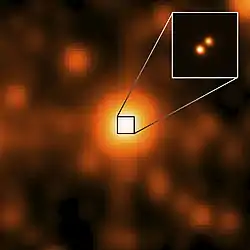Kepler-67
Kepler-67 is a star with slightly less mass than the Sun in the NGC 6811 open cluster in the Cygnus constellation and has one confirmed planet, slightly smaller than Neptune, announced in 2013.
| Observation data Epoch J2000 Equinox J2000 | |
|---|---|
| Constellation | Cygnus |
| Right ascension | 19h 36m 36.8092s[1] |
| Declination | +46° 09′ 59.166″[1] |
| Apparent magnitude (V) | 16.4 |
| Characteristics | |
| Spectral type | G9V |
| Astrometry | |
| Proper motion (μ) | RA: −3.424±0.093[1] mas/yr Dec.: −8.679±0.077[1] mas/yr |
| Parallax (π) | 0.8580 ± 0.0508[1] mas |
| Distance | 3,800 ± 200 ly (1,170 ± 70 pc) |
| Details | |
| Mass | 0.865 ± 0.034 M☉ |
| Radius | 0.778 ± 0.031 R☉ |
| Temperature | 5331 ± 63 K K |
| Metallicity [Fe/H] | 0.012 ± 0.003 dex |
| Rotation | 10.464±0.014 days[2] |
| Age | 1 ± 0.17 Gyr |
| Other designations | |
KOI-2115[3] | |
| Database references | |
| SIMBAD | data |
| Extrasolar Planets Encyclopaedia | data |
Planetary system
| Companion (in order from star) |
Mass | Semimajor axis (AU) |
Orbital period (days) |
Eccentricity | Inclination | Radius |
|---|---|---|---|---|---|---|
| b | 0.31 ± 0.06 MJ | 0.1171 ± 0.0015 | 15.7259 ± 0.00011 | — | — | 0.26 ± 0.014 RJ |
References
- Brown, A. G. A.; et al. (Gaia collaboration) (August 2018). "Gaia Data Release 2: Summary of the contents and survey properties". Astronomy & Astrophysics. 616. A1. arXiv:1804.09365. Bibcode:2018A&A...616A...1G. doi:10.1051/0004-6361/201833051. Gaia DR2 record for this source at VizieR.
- McQuillan, A.; Mazeh, T.; Aigrain, S. (2013). "Stellar Rotation Periods of The Kepler objects of Interest: A Dearth of Close-In Planets Around Fast Rotators". The Astrophysical Journal Letters. 775 (1). L11. arXiv:1308.1845. Bibcode:2013ApJ...775L..11M. doi:10.1088/2041-8205/775/1/L11. S2CID 118557681.
- "Kepler-67". SIMBAD. Centre de données astronomiques de Strasbourg. Retrieved 15 January 2018.
External links
This article is issued from Wikipedia. The text is licensed under Creative Commons - Attribution - Sharealike. Additional terms may apply for the media files.


